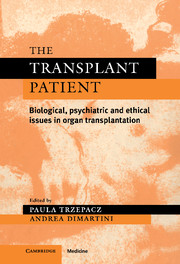Book contents
- Frontmatter
- Contents
- List of contributors
- Preface
- 1 The mystique of transplantation: biologic and psychiatric considerations
- 2 Psychosocial screening and selection of candidates for organ transplantation
- 3 Psychosocial issues in living organ donation
- 4 Quality of life in organ transplantation: effects on adult recipients and their families
- 5 Quality of life of geriatric patients following transplantation: short- and long-term outcomes
- 6 Cognitive assessment in organ transplantation
- 7 Pharmacologic issues in organ transplantation: psychopharmacology and neuropsychiatric medication side effects
- 8 Alcoholism and organ transplantation
- 9 Ethics and images in organ transplantation
- 10 Psychoneuroimmunology and organ transplantation: theory and practice
- 11 Pediatric transplantation
- 12 Current trends and new developments in transplantation
- Index
6 - Cognitive assessment in organ transplantation
Published online by Cambridge University Press: 14 September 2009
- Frontmatter
- Contents
- List of contributors
- Preface
- 1 The mystique of transplantation: biologic and psychiatric considerations
- 2 Psychosocial screening and selection of candidates for organ transplantation
- 3 Psychosocial issues in living organ donation
- 4 Quality of life in organ transplantation: effects on adult recipients and their families
- 5 Quality of life of geriatric patients following transplantation: short- and long-term outcomes
- 6 Cognitive assessment in organ transplantation
- 7 Pharmacologic issues in organ transplantation: psychopharmacology and neuropsychiatric medication side effects
- 8 Alcoholism and organ transplantation
- 9 Ethics and images in organ transplantation
- 10 Psychoneuroimmunology and organ transplantation: theory and practice
- 11 Pediatric transplantation
- 12 Current trends and new developments in transplantation
- Index
Summary
Introduction
Deficits on neuropsychologic tests have been reported in patients with acute and chronic pulmonary (Incalzi et al. 1993), hepatic (Tarter et al. 1991), renal (Hart and Kreutzer 1988), cardiac (Bornstein et al. 1995) and pancreatic (Ryan 1988) diseases. At first glance, it would appear that injury or disease to a vital organ directly causes an encephalopathy that is manifest in part as a cognitive impairment. Upon more careful inspection, however, it is evident that biologic, psychologic, and social contextual factors synergistically determine the pattern and severity of cognitive deficit. Specifically, a cognitive impairment is not invariably due to an encephalopathy caused by organ–system disease. Numerous factors must be taken into consideration, resulting in a variety of etiologic pathways, in determining the extent to which a cognitive deficit is causally related to the medical illness.
Integrity of brain functioning is entirely dependent on the metabolic efficiency of the other vital organs. Because the brain's metabolic reserve capacity is very limited, satisfying its high oxygen, energy, and nutritional needs depends on efficient functioning of other vital organs. Consequently, even slight perturbation, or a small reduction of metabolic efficiency, can disrupt brain functioning to the degree that an encephalopathy is manifest. Impaired cognitive functioning is typically a salient facet of the neuropsychiatric disorder.
This chapter examines the cognitive sequelae of medical disorders in which organ transplantation is a recommended treatment. There is justification for determining the cognitive capacity and efficiency of patients undergoing organ transplantation.
- Type
- Chapter
- Information
- The Transplant PatientBiological, Psychiatric and Ethical Issues in Organ Transplantation, pp. 164 - 186Publisher: Cambridge University PressPrint publication year: 2000
- 2
- Cited by

